I am partially reading input into a buffer in a function and then freeing it in main() but it doesn't seem to be working. My code:
char *save_to_buff()
{
int fd = 0; // set read() to read from STDIN_FILENO, because it's number is 0
const size_t read_size = 100; // set chunk size
size_t size = read_size;
char *buff = malloc(size+1);
size_t offset = 0;
size_t res = 0;
while((res = read(fd, buff + offset, read_size)) > 0) // partial read from stdin and save to buff
{
if(res == -1) // check for read errors
{
read_error();
free(buff);
return NULL;
}
offset += res;
if (offset + read_size > size)
{
size *= 2;
buff = realloc(buff, size+1);
}
buff[offset] = '\0';
}
return buff;
}
main:
char *buff = save_to_buff();
// do sth
free(buff);
Edit: just tried it with a 1 byte read and not a partial read and there is no memory leak.
